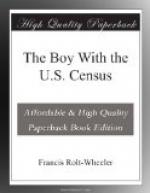“Why are they called ’Crackers’?”
“I don’ know, unless because they live on cracked corn and razor-back hog. It an’t so easy to say how they begun. Thar’s a lot o’ French names, an’ thar’s a tradition that two shiploads o’ Huguenots were wrecked off Georgia in the early days an’ foun’ their way inland, settlin’ down without anythin’ to start with, an’ not knowin’ for a generation or two whar any settlements could be foun’. An’ thar’s a lot o’ folks that have just drifted down, down,—livin’ jes’ like the ‘Crackers’ an’ often taken to be the same. An’ the slavery system made it worse because thar was no middle white class—either rich or po’, thar was nothin’ between,—that is, down in that part o’ the country. But yo’ mus’ remember that thar has been a great change in the last twenty years, an’ that the children o’ ‘Cracker’ families are doin’ jes’ as well as anybody in the South.”
“How is that, Uncle Eli?”
“Wa’al, in the days befo’ the war, the po’ whites were jes’ trash. The planters wouldn’ have ’em, because the slaves did all the work; they wouldn’ work themselves, an’ they didn’ own slaves. So they were worse off than the negroes an’ even the black race looked down on ’em. But the war waked them up.”
“They all fought for the South, didn’t they?”
“Mos’ly all. They were food fo’ powder, but I always reckoned they hindered more’n they helped. For the ‘Cracker,’ however, the war meant everythin’. It placed him side by side with the Southern gentleman, it strengthened the color line, an’ jes’ enough o’ them made good to show the others thar was a chance fo’ them, too.”
“Then they started in to improve right after the war, did they?”
The Kentuckian shook his head negatively.
“No,” he said, “at first they were far worse off than befo’ because the Freedman’s Bureau an’ the carpet-baggers made trouble right an’ lef’. The No’th had a fine chance, but the carpet-baggers were jes’ blind to everythin’ excep’ the negro, an’ the po’ white was jes’ as shabbily treated by the No’th as he had be’n by the South. Now that everybody is seein’ that yo’ can’t make a negro jes’ the same as a white man by givin’ him a vote, thar’s a chance fo’ the po’ white. I reckon the ‘Cracker’ as a ‘Cracker’ is goin’ to be extinct pretty soon, an’ the South is goin’ to be proud o’ the stock it once despised. Atlanta is the fastes’ growin’ city in the South, an’ Atlanta is jes’ full o’ men whose folks weren’t much more’n ‘Crackers.’ The po’ white, in a few years, is goin’ to be only a memory like the backwoodsman o’ the time o’ Dan’l Boone.”
“That promises well for the South,” said Hamilton.
“The boom o’ the South is jes’ beginnin’,” the old man said, “an’ if you’re goin’ to do census work this next year, yo’ jes’ watch the figures an’ see whar the old South comes in. It’s a pity you’re goin’ back to Wash’n’ton to-morrow, as I think yo’ ought to see more o’ this country befo’ yo’ go.”




